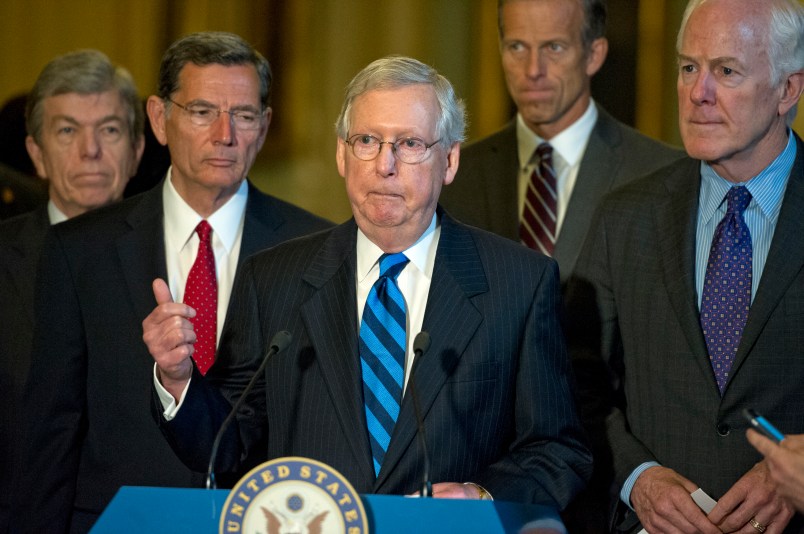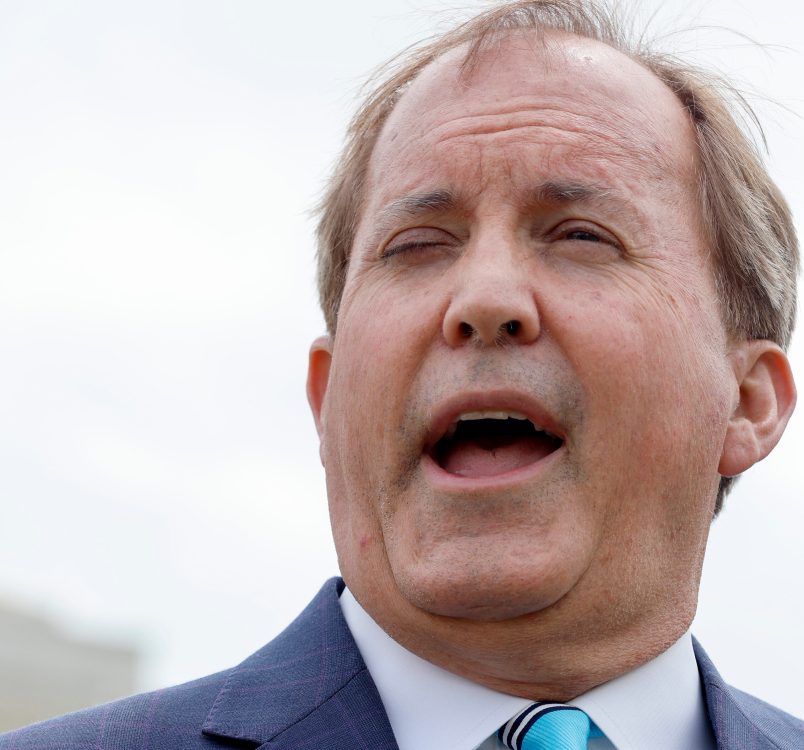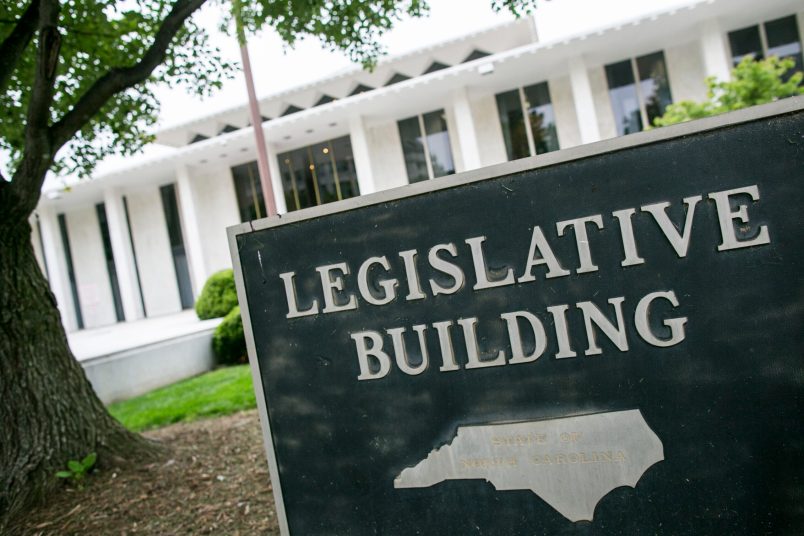Thursday will be a deja vu moment on the Senate-side of the Capitol. Senate Republicans will gather in a private room off the Senate chamber to go over a freshly unveiled health care bill they hope they can pass to fulfill their years’ long promise of dismantling the Affordable Care Act.
But, like the morning they went through this exercise a few weeks ago, deep disagreements remain among the conference over how to replace Obamacare and whether that effort should include a gutting of Medicaid. There’s been no sign yet that Majority Leader Mitch McConnell (R-KY) has hit the sweet spot. He needs to win 50 out of 52 Republican votes to pass the legislation. Yet he has previewed a quick turnaround time between unveiling his revisions to the Better Care Reconciliation Act and a vote on the bill, with a Congressional Budget Office score coming as early as Monday, and an initial procedural vote also next week.
Here are the five big unknowns going forward:
Did McConnell change enough to get rid of the old bill’s stench?
It was obvious that McConnell didn’t want to send members home for the July 4 recess without taking a vote on the legislation, and last week, while they were home, it became clear why. Very few Republicans aggressively promoted the legislation—many spent their recess in hiding—and those who did make public appearances distanced themselves from the effort.
Rank-and-file Republicans like Sen. Jerry Moran (R-KS) and John Hoeven (R-ND) came out against the old draft, and high-profile defectors like Sens. Shelley Moore Capito (R-WV) and Susan Collins (R-ME) defended their opposition.
Now, whether they can come back around will depend on if the revised bill at least looks different enough for them to justify supporting it. So far though, the sense is there hasn’t been a major overhaul—beyond Obamacare taxes for high-earners being preserved and extra funding for opioid programs.
“I don’t think there’s going to be that many dramatic changes,” Sen. Ron Johnson (R-WI) admitted to reporters Wednesday, after a Senate GOP lunch.
What the hell is going on with the Cruz amendment?
Perhaps the most substantive change to the legislation on the table is a proposal by Sen. Ted Cruz (R-TX) to let insurers sell unregulated plans as long as they offer an Obamacare-compliant plan as well. Cruz, however, could not tell reporters Wednesday when the CBO would be done scoring the provision, if it would be included with the legislation being unveiled Thursday or even when the text of his proposal will be made public.
Nonetheless, he indicated that he’d vote against advancing the bill, including on the first procedural vote, if it wasn’t part of the base legislation.
Other Republicans have raised concerns about Cruz’s idea, because it would likely to gut pre-existing protections many GOP lawmakers vowed to protect. The insurance industry agreed with their sentiments, in a statement bashing the Cruz proposal Wednesday.
Thus, other Republicans like Sen. Mike Rounds (R-SD) and Sen. Bill Cassidy (R-LA) have been suggesting tweaks to Cruz’s proposal to make it more workable. Here again, the details are sparse. It’s unclear how far along they are in writing adjustments to Cruz’s amendment, whether those tweaks would solve the major policy problems, or how making those adjustments would fit in the aggressive timeline McConnell has laid out for passing the legislation.
Will moderates swallow big Medicaid cuts?
Enough Republicans opposed the draft bill’s deep Medicaid cuts to kill it. Yet, it’s expected that those provisions — which both scale back the ACA’s Medicaid expansion and gut the traditional program — will remain largely unchanged in the latest version.
Its passage, thus depends at least three of the following—Sens. Capito, Collins, Dean Heller (R-NV), or Lisa Murkowski (R-AK)— flip-flopping on their previous requests that the cuts be softened. Rounds suggested that tweaks to the Medicaid formulas could be made in the amendments process known as vote-a-rama that will occur on the Senate floor some time after next week’s expected procedural vote on the bill. There’s some skepticism, however, as to whether that would really result in substantive changes to the bill, since McConnell will still tightly control the process. (Hence, Cruz’s insistence that his proposal be included in the base text.)
“A fully amendable bill after the motion to proceed should give everyone a sense that they’ll have an opportunity to make whatever point they want to make,” Sen. Roy Blunt (R-MO), a member of the GOP leadership team, said.
Can they get the bill past the first hurdle?
We could know as soon as Tuesday whether the GOP repeal effort is doomed. McConnell has been insistent that a vote on the motion to proceed—which advances it procedurally to consideration, before a final vote—will come some time next week.
Some Republicans are arguing that, despite their or other GOP lawmakers’ reservations, they should at least vote for this initial step.
“I just can’t imagine not voting to proceed to a bill when you’ve got an open amendment process and you can offer any amendment you wish and you still have a vote at the end of the process,” Sen. Bob Corker (R-TN) said Tuesday.
Already one Republican, Sen. Rand Paul (R-KY), has said he’ll vote against it there, so it would only take two more GOP members to kill next week’s motion, perhaps if they see no point in taking politically tough votes during the vote-a-rama. The prospect of a failed motion to proceed was what McConnell was facing when he delayed a vote last time.
Sen John Thune was just asked if the motion to move forward on the health bill fails. “That would be highly problematic.”
— Paul McLeod (@pdmcleod) July 12, 2017
Is the timeline just too fast?
Which brings us to the next unknown: what happens if the votes aren’t there next week, but there’s a path to securing them in the future. McConnell has already delayed the August recess by an extra two weeks. Though he has said health care is still an agenda item for next week, there still is that extra time as a fallback. And by keeping some of Obamacare’s taxes on high-earners, McConnell has some money to work with to try to make things work. Will an extra two weeks be enough to settle on a version of the Cruz amendment that the broader GOP conference is willing to swallow? Or to make some adjustments to Medicaid provisions that expansion state senators can claim as their victory?
Or will McConnell decide that if he can’t draft a deal on health care now, a deal on health care is just not possible?






